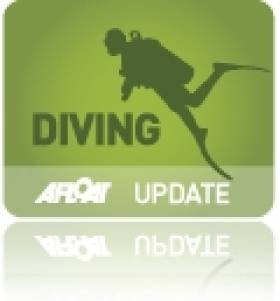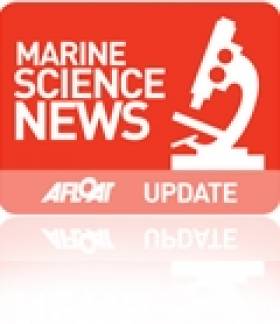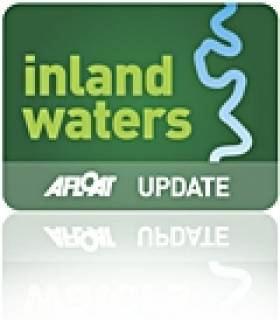Displaying items by tag: History
NUI Galway Hosts Talk on Historical Wreck Diving in Ireland
#DIVING - The Sub-Aqua Club at NUI Galway and the Galway-Mayo Institute of Technology welcomes diving expert Edward Bourke to the NUI Galway campus on 18 October to give a talk on historical wreck diving in Ireland.
The talk will take a look at some of the exploits of wreck and salvage dives in Ireland over the years, exploring the nation of the Irish coast as a hotbed of pioneering subaquatic activity, driven mostly by the recovery of shipborne cannons - not only because of their expense, but also to prevent their falling into the hands of insurgents.
Bourke will give his talk at the Siobhán McKenna Theatre in the Arts Millennium Building at 7pm on Thursday 10 October. The evening will be of interest to local historians and divers alike. And as much of the activity was on the west coast, there is some local maritime interest, too.
Edward Bourke is a microbiologist, maritime historian and diver with Viking Sub Aqua in Dublin for 30 years and has dived in Australia, South Africa, Spain, Croatia, France and UK as well as Ireland. He has published three volumes on Shipwrecks of the Irish Coast, cataloguing some 6,000 wrecks in Irish waters, as well as a book of Irish shipwreck photos and a volume on the wreck of the Tayleur at Lambay Island. A scientist with Diageo, Bourke's most recent publication is a history of Guinness.
Requiem for Titanic Victims on 100th Anniversary
#TITANIC - Philip Hammond's Requiem for the Lost Souls of the Titanic will be staged at St Anne's Cathedral on the centenary of the tragedy, BBC News reports.
The Belfast composer has spent over three years working on the "haunting" music that will pay tribute to the more than 1,500 people who lost their lives when the TItanic sank in 1912.
His requiem uses phrases from variations of the 'Nearer My God to Thee' and takes influence from Irish folk songs from the 1792 Belfast Harp Festival.
Accompanying the music will be lyrics from the original Latin Requiem Mass sung by the Belfast Philharmonic Society, Anuna, the Schola Cantorum of St Peter's Cathedral, Belfast, and Cappella Caeciliana.
The cathedral itself will also be part of the story, with seating arranged to imitate that on a ill-fated ship.
"It is part of history and it is part of who we are," said Hammond of the Titanic story.
BBC News has more on the story HERE.
Marine Education Programme Makes a Splash
The wonders of Ireland's marine life came to the LifeTime Lab in Cork on Monday with the launch of a fortnight of school visits in tandem with the Explorers marine education programme for primary schools.
The programme aims to empower primary teachers to include marine themes in their classes via specially devised lesson plans and support services adapted to the curriculum, including in-service cources on seashore ecology, marine history, arts and crafts, and mathematics.
“The Explorers Programme focuses on Ireland’s two greatest natural resources – our vast undersea territory and our young people,” said Dr Peter Heffernan, CEO of programme partner the Marine Institute. “If Ireland is to develop a thriving marine sector in tomorrow’s world, then it will be the young people of today who will make it happen.”
The programme - which has already been rolled out to some 40 primary schools in the west of Ireland from Mayo to Clare, and in six schools in and around the capital - is a collaborative effort between the Marine Institute, Forfas Discover Primary Science, the Galway Atlantaquaria and Galway, Mayo and Clare Education Centres in the west, and the Bray Sea Life Centre and Blackrock Education Centre in the Dublin area.
Manager of LifeTime Lab Mervyn Horgan said his team was "delighted to be involved" in the pilot series of workshops.
"We are always looking for new and innovative ways of engaging in science education and raising the awareness of marine science in Cork classrooms can only bring long term benefits,” he added.
For more details visit the Explorers website at www.explorers.ie.
New Visitor's Guide to Historic Lagan Canal
Lesser Spotted Ulster's Joe Mahon was on hand to launch the first comprehensive free visitor's guide to the inland waterway's Lagan Canal recently, the Ulster Star reports.
The new guide provides information on the canal's storied history and its abundance of wildlife from Belfast to Lough Neagh.
Lagan Canal Restoration Trust manager Cathy Burns said: “For the first time this guide offers visitors details of all there is to see and do along the canal.
"We hope that it encourages many more visitors and local people to take the opportunity to get out and experience the hidden gem that is the Lagan Canal."
A Guide to the Lagan Canal, Past, Present and Future is available to download online at lagancanaltrust.org.
‘Follow the Fleet’ Essay Competition Reminder
Schools can register details by logging on the webite where a username and password will be provided. All details with essay guidelines, entry forms and competition details and rules are available on www.imdo.ie/followthefleet/news.asp
































































